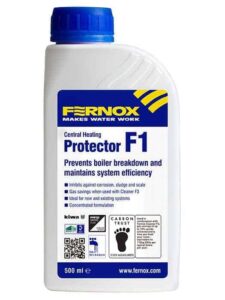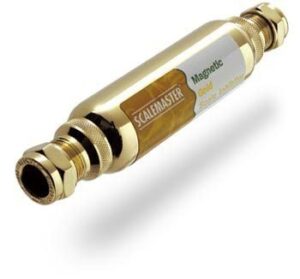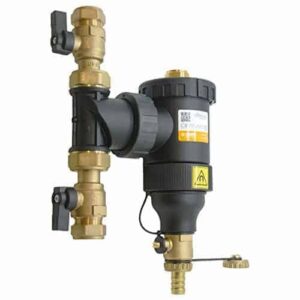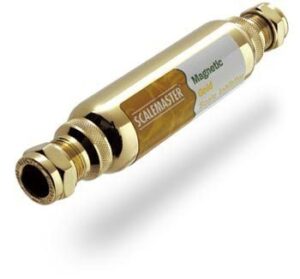Central Heating Inhibitor (In-depth) Guide
If you don’t know already, central heating inhibitor is one of the crucial products that protects your heating system. And if you don’t believe us, dig out your boiler warranty…
Most boiler manufacturers insist that heating systems are dosed with inhibitor. If they’re not? Your boiler warranty could be void!
So, What Is Central Heating Inhibitor?
All heating systems will suffer from heating sludge build-up over time. This sludge comes from: 
- Minerals in water
- Rust inside pipes and radiators
Over time, this breaks off and either liquifies into heating sludge, or gets stuck in important components throughout your heating system.
It can lead to annoying and costly problems such as:
- Blocked heat exchangers, pumps and other expensive boiler parts
- Radiators that get hot at the top, but not at the bottom
- Blockages meaning heating won’t get to temperature
- The list goes on…
Central heating inhibitor is a powerful liquid that helps break down rust and minerals quickly.
But, it’s only the first piece of the puzzle.
Adding heating and radiator inhibitor is pointless, if you don’t have a method of extracting this sludge from your system.
The 3 Things You Need To Protect Your Heating System
And that leads us to this. To fully protect your boiler and heating system, you’ll need three things:
- Heating and radiator inhibitor
- A magnetic boiler filter
- A scale reducer (more important in hard water areas, but it never hurts to have one)
These three items combined will:
- Protect your boiler from expensive repair bills
- Improve the efficiency and output of your heating system
- Ensure no problems occur with your heating (such as radiators not heating up)
- Guarantee that your boiler warranty isn’t void
We’ll quickly explain how each piece of the puzzle works…
#1 – Heating & Radiator Inhibitor
As we’ve mentioned, your heating & radiator inhibitor will break down any rust and minerals, so it’s easily extracted from your heating system.
#2 – Magnetic Boiler Filter
Now the junk in your heating system has been broken down, it needs to be removed from the system.
This is where the magnetic boiler filter comes in. This will catch most heating sludge.
These units will fill up with gunk over time. And when they do, they’ll no longer have the capacity to remove heating sludge.
For that reason, they must be cleaned out (once per annum with your annual boiler service, will be fine).
#3 – Scale Reducer
Scale reducers are usually recommended in hard water areas. However, for their price and the damage they prevent, we’d recommend having one fitted anyway.
 Scale reducers help to remove limescale (which comes from the minerals in water). Magnetic boiler filters won’t be able to catch this scale.
Scale reducers help to remove limescale (which comes from the minerals in water). Magnetic boiler filters won’t be able to catch this scale.
Limescale can:
- Build up on heat exchangers, creating hot spots that lead to cracks, and repair bills over £350+!
- Stop radiators working
- Mess with temperature sensors, meaning the boiler will switch off before it should
Essentially, it’s a small price to pay, for something that’s going to increase efficiency, reduce boiler problems and save you money on repairs.
The Best Central Heating Inhibitor
First up, which heating inhibitor should you buy? 
There’s no “best” product so to speak. But, you’ll want to stick with reputable brands.
And, it’s important you choose the right protector. Each brand has a range of heating liquids designed for different things.
We’d consider the following three to be the best central heating inhibitors on the market. You won’t go far wrong with any of them:
Our Pick For The Best Heating Inhibitor
We have no qualms using any of the above inhibitors.
But given the choice, we’d be heading for the Fernox F1. It was a top seller in the plumbing merchant I worked at, alongside their other boiler chemicals like F3 (cleaner) and F2 (boiler noise silencer). You can jump over to their site and read more about the Fernox range here.
The Best Boiler Filter To Catch Sludge
Next, you’re going to need a magnetic boiler filter to catch sludge.
We’ve created a larger guide dedicated to magnetic boiler filters here. 
Here’s that in summary…
Pipe Size
When buying a boiler filter, make sure you know what inlet pipe size you have to your boiler.
It will be 22mm or 28mm. And, boiler filters are sized to suit. Hopefully, it’s 22mm, as these filters are much cheaper than 28mm.
Filter Size
Boiler filters aren’t a one-size fits all, and prices vary a great deal.
Most brands produce a normal sized filer (for instance, the MagnaClean Pro 2), and a compact filter (such as the MagnaClean Micro).
These compact filters have a smaller housing, and that means they’ll be able to collect less sludge.
For small properties with only a few radiators, a compact filter will be fine if cleaned out regularly.
But personally, we’d always opt for a full-size filter.
Our Pick For The Best Boiler Filter
If budget allows, we’d be heading for the Fernox TF1.
However, the cheap option that we’d recommend comes from Altecnic. Essentially, they’re up there with the leading brands, but they don’t brand themselves as well. They make a tonne of quality plumbing and heating parts.
What does that mean? The Altecnic boiler filter offers similar performance as the likes of the TF1, for a fraction of the price.
The Best Scale Reducer To Remove Limescale
Now we’re onto catching limescale. 
I worked at a plumbing merchant for a couple of years, and know that the ScaleMaster brand is the top selling scale reducer we stocked.
In fact, they produce scale reducers for lots of the brands mentioned above (who then, brand them as their own).
So, if you’re looking for the best scale reducer, I’d be heading for ScaleMaster, with my second choice being MagnaClean.
Why You Shouldn’t Keep Topping Up Boiler Pressure
Now you’ve got your central heating inhibitor, boiler filter and scale reducer; here’s a quick warning.
One of the most common problems we come across, is boilers losing pressure.
Pressure loss comes from leaks.
This could be something simple, such as a pin-hole in a radiator. However, it could be something more serious, like a leaking boiler, which could damage internal electronics.
Either way, we find most people simply keep topping up their boiler pressure. As water escapes and you add more, you’ll be diluting your central heating inhibitor.
Every time you top up, you’ll have lost some inhibitor. Eventually, your boiler and radiators won’t be protected.
So:
- Find the leak causing system pressure loss
- Re-dose your system so it’s holding the correct amount of inhibitor
What’s Next?
Thanks for reading our 5-minute guide to central heating inhibitor, and the best ways to protect your heating system.
Still got questions? Drop a comment below and we’ll reply as soon as possible.
How much for service and gasket replacement on 11-yr-old Fernax TF1